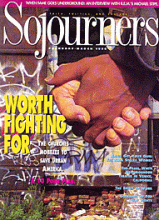These are difficult days for those who argue that America is a homogenous culture built on European-Christian principles. Recent reports that Mark Twain "borrowed" an African-American oral tale as the premise for Huck Finn and that Stephen Foster lifted "Dixie" from an African-American family in Ohio question the role of the giants of American traditional culture. And that's just the beginning.
One is left with questions for the "cultural warriors" who seek to "take back" America from those whom they perceive as having wrestled away control of the reins. Did the culture they want to bring back ever exist anywhere but in their minds? Did the land to which they want to return ever exist?
Canon Fodder
Last month this column focused on the emerging culture wars. In looking at Robert Hughes' Culture of Complaint, Michael Medved's Hollywood Vs. America, The Disuniting of America by Arthur Schlessinger Jr., and James Davison Hunter's Culture Wars, a picture of the battlefield was painted, albeit a black-and-white one. These books offered, to varied helpful degrees, insight into some of the issues at stake.
This month the discussion continues. We dig an inch or two deeper to discover the energy that drives the cultural scene and the industry that attempts to manipulate that energy.
Discussion of the culture wars became fashionable with the rise of campus activism, especially around the quincentenary. Authors such as Schlessinger, then-Secretary of Education William Bennett, and young gun Dinesh D'Sousa recounted examples of political correctness run amuck. Radio talk show hosts climbed aboard for the ride.
But Henry Louis Gates Jr., a professor of humanities and Afro-American studies at Harvard University, is unwilling to give over the debate. In Loose Canons: Notes on the Culture
Read the Full Article
